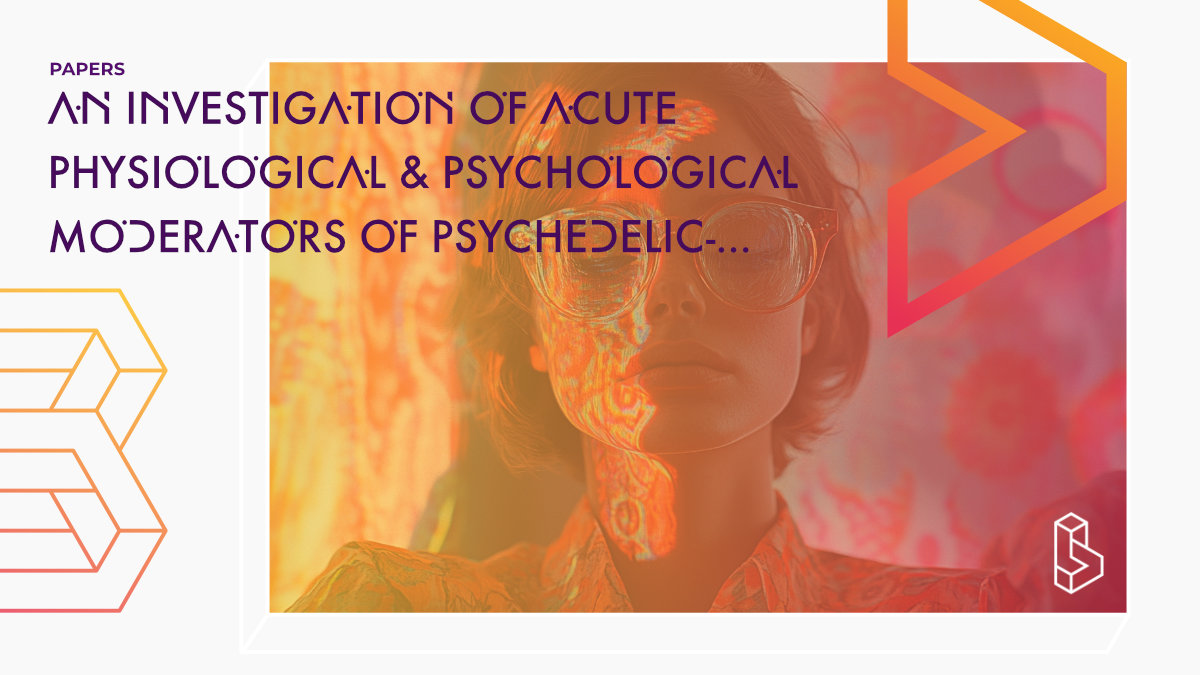This re-analysis of a single-blind, fixed-order trial (n=28) investigates the effects of a single high-dose psilocybin (25 mg) on personality traits in psychedelic-naïve healthy volunteers. It finds significant reductions in neuroticism one month post-administration, moderated by subjective experience meaningfulness and ego dissolution, suggesting psilocybin catalyses lasting personality changes with therapeutic potential.
Abstract of An investigation of acute Physiological and Psychological Moderators of Psychedelic-induced Personality Change among Healthy Volunteers
“This study investigated the effects of a single high-dose of psilocybin on personality traits in psychedelic-naïve healthy volunteers. These data originate from a larger within-subjects fixed-order design trial, where a single high dose of psilocybin (25 mg) was administered in a psychologically supportive setting and was compared against a (one-month) prior, 1 mg ‘placebo’ dose. Personality shifts were assessed by the Big Five Inventory and the Big Five Aspect Scale, while the Altered States of Consciousness questionnaire (5D-ASC) and the Psychological Insight Scale gauged the acute psychological effects of the substance. Electroencephalography provided neurophysiological insights, specifically examining alpha power and Lempel-Ziv complexity (LZc). Results indicated significant reductions in neuroticism one month after 25 mg psilocybin administration, a finding consistent with prior studies. Reductions in neuroticism were moderated by the subjective meaningfulness of the psychedelic experience, as well as by the dread of ego dissolution subscale of the 5D-ASC, suggesting a relationship between acute drug effects and enduring personality alterations. Thus, this study substantiates the role of acute psychedelic states in catalysing lasting personality transformations in a generally beneficial direction, with broader implications for therapeutic applications and understanding of personality dynamics.”
Authors: Kate Godfrey, Brandon Weiss, Xinhu Zhang, Meg J. Spriggs, Joseph M. Peill, Taylor Lyons, Robin L. Carhart-Harris & David Erritzoe
Summary of An investigation of acute Physiological and Psychological Moderators of Psychedelic-induced Personality Change among Healthy Volunteers
This study investigates the effects of a single high-dose (25 mg) of psilocybin on personality traits in healthy, psychedelic-naïve volunteers. It aims to determine whether acute psychological and neurophysiological responses during the psychedelic experience can predict long-term personality changes. Classical psychedelics, such as psilocybin and LSD, are known to induce profound alterations in consciousness, including emotional breakthroughs, sensory distortions, and feelings of connectedness. These experiences are thought to catalyse lasting psychological transformations, particularly in traits associated with emotional regulation and openness.
Prior research has highlighted the potential of psychedelics to influence personality traits, with studies often reporting increases in openness and reductions in neuroticism. However, variability in findings suggests that individual differences in subjective and neurobiological responses may moderate these outcomes. The present study builds on this foundation by exploring both psychological experiences and neurophysiological markers, such as brain activity complexity, to identify predictors of enduring personality changes.
The authors hypothesised that neuroticism would decrease and openness would increase following the 25 mg dose but not after the 1 mg placebo dose. They also examined whether acute psychological effects, including mystical and challenging experiences, and neurophysiological markers like brain complexity, would predict the magnitude of personality changes.
Methods
Study Design
Find this paper
https://doi.org/10.1016/j.nsa.2024.104092
Open Access | Google Scholar | Backup | 🕊
Cite this paper (APA)
Godfrey, K., Weiss, B., Zhang, X., Spriggs, M., Peill, J., Lyons, T., ... & Erritzoe, D. (2024). An investigation of acute Physiological and Psychological Moderators of Psychedelic-induced Personality Change among Healthy Volunteers. Neuroscience Applied, 104092.
Study details
Compounds studied
Psilocybin
Topics studied
Healthy Subjects
Personality
Study characteristics
Original Re-analysis
Single-Blind
Within-Subject
Participants
28
Humans
Institutes
Institutes associated with this publication
Imperial College LondonThe Centre for Psychedelic Research studies the action (in the brain) and clinical use of psychedelics, with a focus on depression.
Compound Details
The psychedelics given at which dose and how many times
Psilocybin 1 - 25mg | 2x
Linked Research Papers
Notable research papers that build on or are influenced by this paper
Effects of psilocybin therapy on personality structureThis open-label study (n=20) found that dosages of psilocybin (10, 25mg) in a supportive setting, for those with treatment-resistant depression (TRD), changed their personality. At 3-month follow-up, Neuroticism was decreased, Extraversion and Openness were increased. The changes were similar (but more pronounced) to changes after conventional antidepressant treatment.
Personality change in a trial of psilocybin therapy v. escitalopram treatment for depression
This analysis of an RCT (n=59) investigates the impact of psilocybin-assisted therapy (PAT) and escitalopram on personality traits in patients with moderate-to-severe major depressive disorder over a 6-week trial period. Significant decreases in neuroticism, introversion, disagreeableness, and impulsivity, and increases in absorption, conscientiousness, and openness were observed in the PAT group, while similar changes were seen in the escitalopram group.

